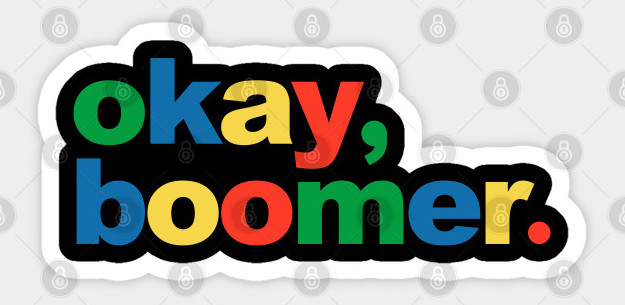
It is interesting to hear all the comments from Generation X, Millenials, and Gen Z about how we Baby Boomers had it so good. What is rarely mentioned is what we didn’t have so good. Maybe Gen X, Millenials or Gen Z would like to experience some of what we experienced then tell us if they would have liked to grow up in the good old days. If anyone younger than 40 tells you what a great time the Baby Boomers had, give them this to read.
I don’t want to make this autobiographical but will draw on my experiences. I was born in 1947 and will talk about growing up in the ’50s. I have used some examples of the things we did that are totally alien today.
I had an average, middle-class upbringing in a middle-class suburb. I didn’t know poverty or privilege so my experience is the experience of most of the Baby Boomers in Australia in those years. There will always be people on both sides of the middle class who had different experiences. I am only going to talk about the majority. The middle.
Our Parents
Many fathers had come out of the second world war. The term PTSD was not invented, much less understood. You just needed to get over it. Many fathers were distant from both their partners and children. Many had problems with alcohol. There was a sort of male grouping where they may talk about their experiences but it was mainly based on men bonding through drink.
Our mothers were expected to stay home and raise the children. Most women were forced to give up work when they became pregnant. The glass ceiling was just above floor level for women of the day. Their role was to cook, look after the house and raise the kids on an allowance from their husband.
Divorce was not very common. As late as 1959, the Matrimonial Causes Act provided 14 grounds for a divorce. The most common grounds included desertion, adultery, habitual drunkenness, cruelty, insanity and imprisonment. Fault had to be proven before a divorce was granted. There were a lot of marriages that should not have continued. Who suffered beside the couple? The Baby Boomers.
Pre-school
There was no preschool so you stayed home with your mother until you were ready to go to kindergarten. In my case I had just turned 4 when I was sent off to kindergarten.
Now kids do all sorts of sports and activities from soccer to swimming to dance at a young age. None of these were available to Boomers. You just hang around doing whatever your mother decided to do.
School
If you tell a Gen X, Millenial or Gen Z person that you were in a class of 60 they would not believe you but that was the not unusual in the 50s. My final year consisted of two classes of around 60. By the end of the ’50s in NSW, the average class size was still 48.
The approach was “talk and chalk”. The teacher stood at the front of the class and talked. You were supposed to listen and not contribute unless specifically asked. There were no group activities or breakout groups. You took some notes and hoped you were able to pick up what was being taught.
If you got behind, there were no coaching schools or private tuition. You just sank further. I had one experience of nearly a year of falling marks in maths. Maths is a subject that builds on previous knowledge. Miss one step and it all falls down. I was extremely lucky that a teacher gave me private tuition during lunch to get be back on track. I will always owe a debt to that teacher. My experience was far from normal.
At the time I was in school, after Kindergarten and six years of Primary, High School consisted of five years with an Intermediate Certificate at the end of year three, and a Leaving Certificate after year five. The six-year High School arrived a few years after I left. I completed the LC before I turned 17.
In our school, subjects available were English, Maths 1 and Maths 2 or alternately General Maths. Languages were French and Latin. History was either Modern or Ancient. Science consisted of two subjects. Physics and Chemistry. You could also select Geography or Business Studies. Most of us did 6 or 7 subjects.
Contrast that with the multitude of subjects available today. There was no subject that addressed artistic themes. Languages were totally out of date and lacked relevance to the world of the 1950s. There was no biology. We never touched on what makes a human or animal work. Reproduction was verboten.
Bullying in the playground was a way of life. Teachers took little action to stop certain kids being picked on. There was a back lane behind the school and many problems were sorted out by a fight after school. One altercation I had was a double-whammy. I had a fight that ended in a draw, then got home with clothes torn and covered in blood to get a serve from Mum. Dad’s only comment was that I needed to learn how to fight better.
Discipline
Children were regularly hit by their parents in the 50s. It was the accepted way of parenting. My mother took to me regularly with a plastic fly swat. Once she broke it around my legs. After I just stood there and said “Are you finished yet?” she took to me with the broken handle. Dad used a leather belt across the bum for something like telling a lie or being difficult.
School was worse. The school I attended was run by the Christian Brothers. We all regularly got the strap. The strap was customised by the teacher. It was typically about 300-400 mm long, about 25 mm wide and about 15-20 mm thick. Sometimes it had a hacksaw blade inside to give flexibility. Sometimes it would just have a piece of wood inside to keep it rigid.
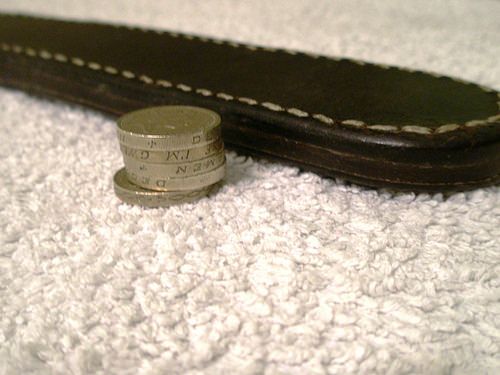
You would get anything up to six hits on each hand. You had to support one hand with the other and if you pulled away, the stroke was repeated. The teacher would raise the strap over his head and swing with all his might. I say “his” because there were no female teachers.
One incident I do recall was being called up from the back of the class to get six on each hand. When I sat down I put up my hand to ask a question. “Why did I just get six on each hand, sir?” Stupid. I got another dozen for my insolence. My hands were bleeding after two dozen. I got no sympathy at home. “You must have deserved it.” was my mother’s response.
Can you imagine that today?
Parenting
Probably the biggest difference with the boomer experience in parenting was choice. As kids, we were never given choice. “What would you like for dinner?” never happened. It was put on the table and you didn’t leave until you had finished it.
There was no option about what you did, or what you wore, or what you might desire. Kids were brought up to follow instructions. It was our normal. I see kids today drive their parents crazy with “I want…”. We were not given options. Extrapolate that as to how grandparents might treat their grandchildren. How they might see Gen X dealing with their kids offering 4-year-old options for dinner. It is a totally different way to the way we were raised.
Tough Love
An example of the tough love parenting I experienced, but was also typical of the era, was when I was about 13 or 14. Even though I lived in the suburbs I had been taught to use a gun – a 22 rifle. On weekends we might go for a picnic and Dad would take along the 22 for target practice. I was a naturally good shot when it came to target shooting.
Shooting animals seemed like the next step and I pestered Dad to take me out to shoot Kangaroos. We took a road trip holiday through country regions and my pestering continued. Dad took me out one morning and I had my first shot at a kangaroo. It was about 100 metres so the 22 bullet didn’t kill the roo. It fell on the ground with a bullet in the hip, but was still alive.
“Now you finish it off” said Dad. He made me shoot the roo through the head. It took three or four shots to kill it. To say I was traumatised was an understatement. He then found it had a joey in the pouch and said “Now kill the baby”. Tough love to teach me a lesson? How many current generation parents would put their kid through this?
Anyway, somehow I convinced Dad through my tears that we should take the joey and look after it. It was much too young to release into the wild. We did and eventually when I got back home, I raised it. This was in a suburban house about 10 k from the Sydney CBD. I walked it on a piece of rope and got as many shocked looks as if I were doing it today. Eventually, it became unmanageable when I walked it past a shop selling fruit and vegetables, and it decided to help itself. It ended up in a zoo and probably had a happy life.
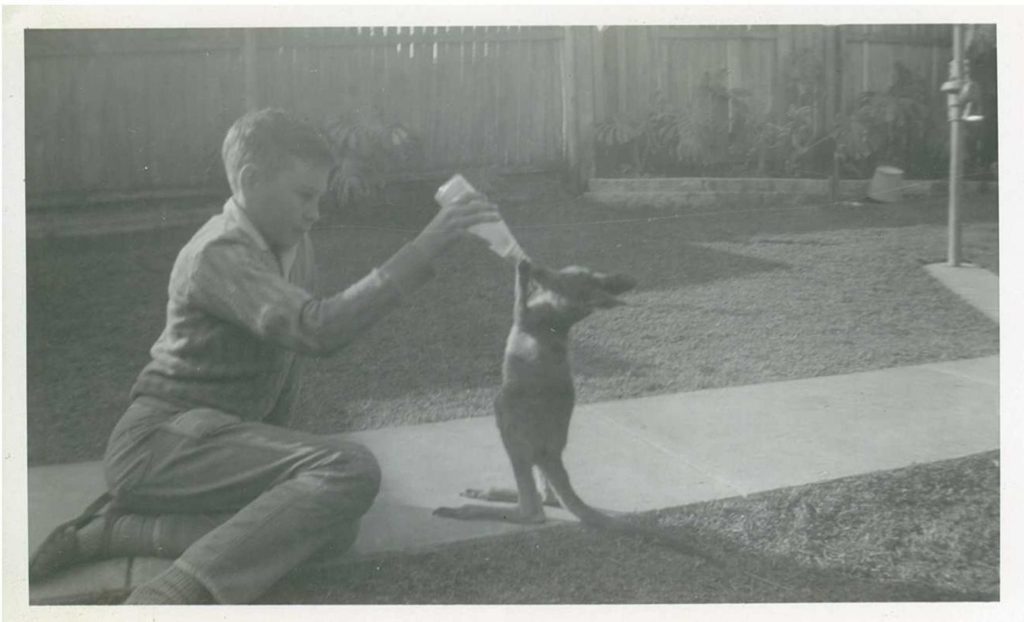
Feeding the baby kangaroo at home
The plan was to teach me that guns and hunting were two different things. It worked. I have never shot anything since but is that something that parents today, or for that matter anyone from Gen X would do to their kids? I think not.
As an aside, I have had lots of fun when overseas when people say “Oh you are from Australia. Do you have a pet kangaroo?” I am the only city kid who can say yes.
Food
Diversity in food is an experience that happened during the Boomer years as young adults. The food at home growing up was meat and three veg or stews. The veg was boiled beyond recognition and the only seasoning used was salt and pepper. Garlic was something exotic used by foreigners.
Eating out was usually at a club such as a football club or RSL (Returned Service League) club. Restaurants were of two types. Chinese and Italian. There were very few other restaurants around.
Alcohol was predominantly beer or spirits. Wine was barely consumed. It was in the 1950s along with post-war migration that wine started to happen. In 1955 the average consumption per year was 10 litres. Most of that was from the migrant population. Today it is 27 litres.
Home
The typical middle class home in the 50s was small by today’s standards. The block may have been similar but tbe ratio between house and backyard was totally different. I went to see the house I grew up in 30 years after I left. I could not believe how small it was. My parents room had a double bed, a wardrobe down one wall, and under a metre walkway around the bed.
Suburban backyards were totally different to today. We had a chicken yard. with about half a dozen chickens and they eventually found their way to the dinner table. By the age of 14 or 15 I was skilled in chopping off their heads with an axe. Gutting and plucking them and delivering them to mum and the oven. Laying eggs in the morning and on the dinner table at night. So, Gen X, is this an alternative to KFC?
We also had an aviary. Not tame budgies. On one side we had a white parrot which had been in captivity for over 30 years and never came down to ground level. It was vicious and inflicted a few serious cuts on fingers of those coming too close. I wonder why? Nobody ever thought about it at the time.
On the other side were finches we trapped. They had a habit of dying in captivity. Nobody ever pointed out that taking them out of the wild and putting them in a cage would have contributed.
We burnt our rubbish. We had a 44-gallon drum which was alight most days. Everything remotely combustible went in the drum. The smoke from our drum and all the neighbours filled the sky. Sundays were a special day around Sydney. Everyone mowed their lawn, and put leaves and grass in the gutter to burn it off. The sky on a Sunday surpassed anything seen recently in Sydney with the exception of the 2020 bush fires. Recycling was not a thing. The word did not even exist.
The house was poorly insulated. Heating was from a kerosene heater. The fumes were probably toxic but nobody ever cared. External walls were asbestos. I often broke a panel and was taught to measure, cut, and replace a broken panel when I was about 12. My cricket practice in the back yard accounted for many panels.
I think I was about the same age when we got the telephone connected. We were probably what would today be called an “early adopter”. The telephone was in the dining room/kitchen area so any chance of a private call was non-existent as long as I lived at home. Calls outside the metropolitan area were charged in 3-minute blocks and were extremely expensive. Overseas calls were for rich people.
Medical
We take a lot for granted with medicine today. We Baby Boomers were expected to get Measles, German Measles, Chickenpox and Mumps. In fact, if someone was infected, we would be encouraged to hang around with them and catch it. Having each of these as a child was considered better than having it as an adult.
When it came to Dentistry, there was no fluoride and so tooth decay was common. Teeth either came out or were filled with amalgam. Tooth decay was a regular problem. As common as getting a cold. Braces to end up with a perfect smile were not considered a necessity. Most parents didn’t bother with braces.
Diseases such as Tuberculous and Polio were killers or could leave you damaged for life. The treatment for polio was the Iron Lung. The Iron Lung was a canister which allowed pressure to be varied to assist breathing. The pressure changed mimicked breathing. A patient would normally spend two weeks in an Iron Lung however some children spent years.
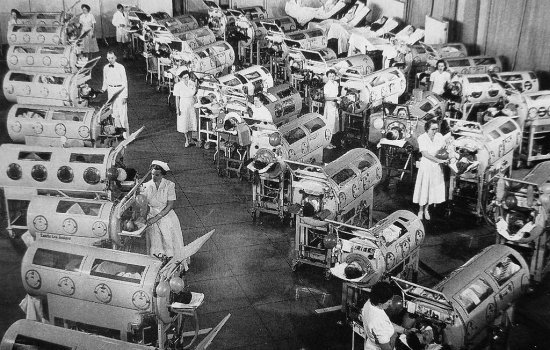
Life expectancy for a male born in 1950 was 66.5. For a woman it was 71.5. For those born in 1994 it was for 75.0 for males and 80.9 for females. Boomers die about a decade younger than Gen X will.
Finally, mental illness was not understood. If someone had a serious mental issue and it was serious enough, they were locked away in an asylum where the chance of recovery was limited. There was no effort to manage mental illness in the workforce. It was not spoken about in public. Mental illness was not so much a disease, it was an embarrassment.
Given the number of people who had been through WWII, you can imagine the number of men who should have been treated. Having a mental illness was seen as some sort of weakness or defect in the person.
Television
We got a TV when I was about 14 or 15. Black and white and quality variable. TV started at noon and closed around 10.30 – 11 pm. No child today would last 5 minutes watching what we watched.
There were only three TV channels until the fourth arrived in 1964. Many of us spent a lot of time reading. If we wanted to find something out we looked up a 20+ volume encyclopedia, not Google. I spent a lot of time browsing through those books.
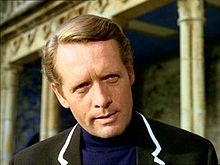
When I was about 18 I was hooked on a series called “The Prisoner” starring Patrick McGoohan as Prisoner Number 6 . It was a futuristic series which broke new ground at the time. I re-watched it a few years back. I could not reconcile how much it appealed to me then, and what an amateurish program it was by the standards of today. The storyline was good but the execution was like watching a 1930s film.
Leisure
Some Boomers remember as kids being out all day mixing with friends. Parents had no concern as to where they might be. Others, like me, lived on the main road so we were restricted to our block of land, or a dirt lane at the back of the house. I was unfortunate in that there were few kids in the area I lived but that was not typical of most Boomers.
We had little reason to stay inside with no computer games, the Internet or Netflix. Our playground was the back yard. Toys were minimal. Some were homemade. There was no Lego but we had Meccano which was probably my most treasured toy. Certainly taught you to put things together with a spanner and screwdriver.
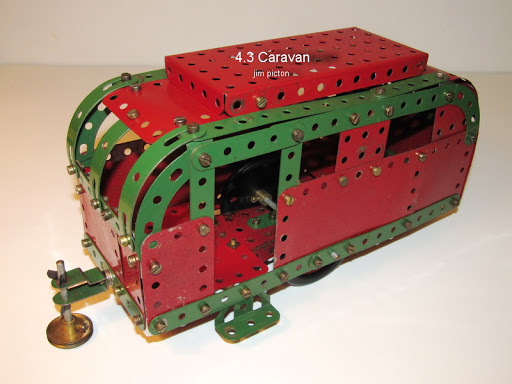
Holidays were exclusively in Australia and you travelled there by car or train. Most middle-class people had never flown, and I cannot think of any kids I knew who had been in an aeroplane much less overseas. I went overseas when I was in my early twenties and aside from the war, I was the second in my family who had left the country. An aunt had been on a cruise around the Pacific.
I had two dogs growing up. If we went away for a few weeks for summer holidays, the dog stayed in the back yard and slept in the laundry. The neighbour put a hose over the fence to fill a water bowl and tossed food over once a day. Nobody thought it was cruel. It was just the way it was. I remember the dog going crazy when we came home. Never heard of pet accommodation.
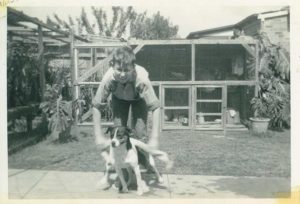
Washing our dog. Aviary in the background
Unfortunately on one holiday the dog caught a lizard a day or two after we left. Being a dog, he took the dead lizard into the laundry and slept with it on a blanket. It was not pleasant when we came home.
Tolerance and Discrimination
This was an era before political correctness. A time before the word “multiculturalism”. Anyone not born here from English stock was a wog, kike, dago, chink, slant-eye or if they happened to be indigenous, a coon, boong or worse. What we would call racial abuse today was acceptable. The norm.
Gays hid their identity but being gay was talked about as if it were leprosy. Announcing you were gay was to put a target on your back. Many gay men were killed and the whole issue hidden or ignored by the police. It was almost a bigger disgrace to the family to follow up the murder of a gay person and make it known they were gay, then to say it was an accidental death.
It did not stop there. Discrimination against women was rampart. Women were only allowed in certain parts of a hotel. Women were forced to give up work when they were married or became pregnant. Women had the vote from 1902 but had not managed to attain any rights beyond that. They were expected to stay at home and look after the house, husband and children.
Religion was another source of discrimination. It existed at both the public and private levels. Many companies or industries gave preference to people of a certain faith. The Masonic Lodge was very strong in some occupations and the only way to progress was to join the lodge.
In my own case, my Mother came from a Catholic family and Dad from a Protestant. In order to get married, they had to agree that children would be raised Catholic. Both parents had nothing to do with churches, but my sister and I still had to attend a Catholic school. I was a lapsed Catholic before I started.
Those suffering mental illness or developmental issues were also fair game for the general population of the 1950s. There were all sorts of name calling for those with developmental issues and it was not seen in any way as cruel to call them those names.
Political
Australia was in the middle of a conservative political period with Robert Menzies as PM. We still saw ourselves as a British colony and answerable to Britain. The Queen was seen as the head of the country and her visits were an opportunity to show our enthusiasm for her rule. We were trotted out as school kids to wave as she drove past.
Our house was probably typical in that politics was never discussed. I had no idea about what was good or bad government. How could I? Newspapers mainly supported the ruling party. The state government, we would later learn, was seriously corrupt, but nobody mentioned it.
The opposition Labor party was tearing itself apart and ended up splitting in 1955. There were accusations of Labor being infiltrated by the Communist Party and they were too busy fighting one another to be taken seriously. We were basically a one party country and everyone seemed happy with that.
The distrust and scrutiny of parliamentarians is something that happened gradually. It started accelerating in the 70s and we have a situation today where most politicians are seen as out for their own good. In the 1950s they were generally regarded with respect.
I, like most of my peers, voted the way my parents did when I first voted at 18. I had no idea that there were policies, and differences between parties. Voting was just something you did and forgot.
After leaving School
By 1950 the number of enrolments of Australian universities was over twice what it had been when the Second World War had broken out (30,630 compared to 14,236) – although enrolments began to taper off in the early 1950s (Official yearbook of the Commonwealth of Australia). Compare that with 2019 where it was about 1.5 million.
In 1960 only 4% of school leavers went to university. Today it is around 40%. Unless you were in the top half dozen in your class (of 50 to 60 kids) you would not even consider a university education. There was a thing called “Vocational Guidance”. You sat a test and based on that test you were steered to a particular interest.
I had a high score for logic, analysis and understanding mechanical concepts. I had an interest in aircraft so they said I should become an aeronautical engineer. All solved. I wasted six years before I finally realised I had no interest in what I was doing.
One positive was that jobs were plentiful. People still tended to stay with one company for decades if not their whole working life. In return, companies provided trainee positions and every year took on a new batch of school leavers to replace the numbers who had retired that year. They invested the time and training to allow loyal staff to rise through the ranks. Starting positions required low skill and were considered menial roles. Somehow, that contract to train people in return for their loyalty has broken down over the decades.
Rights in the workplace were scant compared with today. A company could fire you on a whim and have no fear of consequences. Whistleblowing was not a thing. Today workers rights are much stronger, and companies know they will be held accountable for mistreatment.
The End of the World
Today the concerns for the long term future of the world centre around climate change, terrorism, Covid 19 and the rise of totalitarian regimes such as China and Russia.
Back in the 50s it was the Cold War. It might seem trivial to those who did not live through it, but it the escalation of nuclear weapons between Russia and the USA was seen as potentially the end of mankind.
Think of it this way. 911 was 20 years ago. It caused a total change in the way we think. It brought terrorism to the front of our mind. If it could happen in New York, what was to stop it happening anywhere? In fact we have seen outbreaks all over the world. It is a constant source of concern.
In the 50s, looking back only one decade, the world had been through something that made 911 insignificant. WWII. The shock of what an atomic bomb could do in Japan was fresh in people’s minds. And then, two superpowers were building thousands of bombs that were more powerful than the first ones. They were developing missiles that could deliver the bombs halfway around the world. All it was going to take was one itchy finger and what had happened ten years before in WWII was going to look like a picnic. That was the world the Boomers grew up in.
Relationships and marriage
I have said on a number of occasions that the maturity of a 18 year old in 1960 was probably the same as a 15 year old today. The typical teenage rebellion was happening just as we were leaving school and getting a license. We were able to legally drink and were immortal. What could go wrong?
For a start, cars had a minus five safety rating. Seat belts were not installed in most cars. It was considered normal by our parents – so normal to us – to drive with a blood alcohol content multiple times today’s limits. We got to attend funerals of our peers wiped out in car accidents. Personally I can remember four guys I knew who died in accidents.
The contraceptive pill arrived during the 60’s but that didn’t mean everyone was using it. Initially, it was only available to married women and had a 27.5% tax. Weddings followed by a baby four or five months later were common. My best friend from school was married at 19 and a father before 20. It was not until 1972 that it was made generally available through the PBS. Even then, many conservative doctors would not prescribe it for single women.
Communications
This was probably the biggest difference for us boomers. There was no Internet, mobile phones, computer games or even computers. The home phone was the normal method of speaking to someone if it was not face to face. State of the art for non-telephone communication was the telex. The fax did not really arrive until the 1980s.
If you didn’t use a home phone, you had to use a public phone. In fact after I bought my first apartment, I was so poor I survived on a public phone for about a year before I could afford a home phone. I had borrowed at 8% and it was heading up to 19% so I was definitely over-stretched. It makes the rates today of 2% to 4% look very attractive.
Other things the boomers did without
This is a random list of what we boomers didn’t have that Gen X etc do have:
- No MacDonalds, KFC or Pizza.
- A formality in dress that is antiquated today. No tracksuits except to go to football training; ties at work. Just look at magazines from that era and decide if you want to go back there.
- No tolerance for non-Christians. Atheists and agnostics were almost invisible. Everyone was a Christian. Today 30% of Australians say they have no religion. Only 52% identify as Christian.
- No shopping malls. Everything was either in the city or in strip shopping. A handful of department stores had moved to the suburbs during the late ’50s but no major complexes.
- No Supermarkets. There was the local grocer, butcher, fruit and vegetable shop, bread and cake shop and a tiny hardware shop where you could buy screws in ones and twos.
- No service stations where you serve yourself. My first job at 15 was at a petrol station where I filled the tank, then checked the oil, water, batteries and tyres if requested.
- No air con in either cars or homes.
- No dishwashers
- No swiping to meet people. It was all awkward hard yards.
- No superannuation until 1991
- No Medicare until 1984
- No avocado. Also, such exotic vegetables as zucchini, capsicum, kale or rocket were still to be discovered.
And a couple of things we did have:
- Two recessions in our working life (82-83 and 90-91)
- Conscription and a free visit to Vietnam
- Interest rates at 18 to 19%
- A clergy who took a particular interest in children
What is tougher today
The Boomers grew up in a tough world but it has to be acknowledged that today some things are harder.
Drugs are more prevalent, although marijuana was certainly around in the ’60s. There was some LSD and speed. You could find heroin if you knew where to look. We didn’t have to deal with ice or ecstasy as people do today.
There is now more of a ruthlessness in the relationship between employers and employees than there was half a century back. Casual work is just one manifestation. The Covid pandemic will hopefully become a turning point for casual employment. The ever-growing scandals in companies are also forcing companies to change.
House prices are the obvious bonus the Boomers had. In 1961 in the 25 to 34 age group, 60% were homeowners or at least paying a mortgage. In 2018 it was 37%.
Some of that can be put down to the average age of marriage For males in 1965 it was 23.9 and females 21.2. Today it is 30.7 for males and 29.2 for females. House purchase is often delayed until a couple marries or are in a serious relationship.
The biggest factor, however, is rising house prices which are driven by a number of factors. Bigger houses; higher land prices; lack of new dwellings to meet the demand of both natural population growth and immigration; government subsidies (e.g. first home buyers grants which means all first home buyers add the grant to what they can afford and drive up the price); increasing demand for accommodation closer to work and longer commuting times; overseas purchasers.
Hopefully, housing prices will improve over the next decade. The shutdown of immigration in Australia means supply is finally catching up with demand. Certainly, in the major cities, the big driver of house prices is the shortage of supply. Once all those houses under construction come on the market over the next year or two, it is hard not to see prices falling. In any case, interest rates are likely to remain low for several years.
Summary
When Gen X, Z and Millennials think of the Baby Boomers what comes to mind is cheap housing, plenty of jobs, and an easy ride through life. What is not mentioned are the limitations on those lives. Would you rather be born into the world today, or in the ’40s and ’50s? I know where I would rather be. The world today has a lot more to offer.
A final message to Gen X etc. Remember that in thirty or forty years, you will be where the Baby Boomers are today. It will be your children who are saying how good you had it. How easy it was to grow up around the turn of the 21st century. They will have their own set of problems. Climate Change will be one of the biggest. They will, with some justification, ask why you didn’t do more.
Think ahead to 2060 and try to imagine listening to your children. They will probably say much the same as is being said about Baby Boomers.
Okay Gen X.